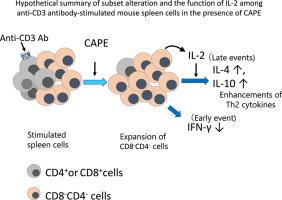经咖啡酸苯乙酯处理的抗 CD3 抗体刺激的小鼠脾细胞通过 IL-2 的功能增强了 Th2 细胞因子(IL-4 和 IL-10)的产生。
IF 2.3
Q1 DENTISTRY, ORAL SURGERY & MEDICINE
引用次数: 0
摘要
目的用抗CD3抗体刺激小鼠脾脏细胞产生的白细胞介素(IL)-2在中国蜂胶(CP)的主要成分咖啡酸苯乙酯(CAPE)的作用下明显增强。本研究评估了经 CAPE 处理的活化脾细胞中 IL-2 的功能意义:方法:在 CAPE 存在的情况下,用抗 CD3 单克隆抗体刺激小鼠脾脏细胞。使用酶联免疫吸附试验(ELISA)检测细胞因子的产生。通过逆转录定量聚合酶链反应(RT-PCR)检测信使 RNA 水平的表达。使用 IL-2 和中和抗体评估 IL-2 功能。使用流式细胞术鉴定和描述脾脏细胞亚群:结果:CAPE 处理抗 CD3 抗体刺激的脾细胞可减少 IFN-γ 的产生,然后增强 IL-2 的产生,接着增强 IL-4 和 IL-10 的产生。加入抗 IL-2 中和抗体后,CAPE 增强 Th2 细胞因子产生的作用完全消失。在没有CAPE的情况下,外源添加的IL-2能在较小程度上促进受刺激脾细胞中IL-4的产生,但不能刺激IL-10的产生。有趣的是,无论有无抗IL-2中和抗体处理,CAPE都能显著降低抗CD3刺激的脾细胞中CD4+和CD8+细胞的比例,并增加CD4-CD8-细胞的比例:结论:CAPE可减少IFN-γ的产生,然后通过特异性升高的IL-2活性增强受刺激脾细胞中IL-4和IL-10的产生。CAPE 以 CD4- CD8- 细胞特异性的方式发挥这些作用。本文章由计算机程序翻译,如有差异,请以英文原文为准。

Productions of Th2 cytokines, IL-4 and IL-10, were enhanced via the function of IL-2 from anti-CD3 antibody-stimulated mouse spleen cells treated with caffeic acid phenethyl ester
Objectives
Interleukin (IL)-2 production by mouse spleen cells stimulated with an anti-CD3 antibody is significantly enhanced by caffeic acid phenethyl ester (CAPE), a major constituent of Chinese propolis (CP). In this study, we evaluated the functional significance of IL-2 in CAPE-treated activated spleen cells.
Methods
Mouse spleen cells were stimulated with an anti-CD3 monoclonal antibody in the presence of CAPE. Cytokine production was examined using an enzyme-linked immunosorbent assay (ELISA). Messenger RNA expression was examined via reverse transcription quantitative polymerase chain reaction (RT-PCR). IL-2 function was assessed using IL-2 and a neutralizing antibody. Spleen cell subsets were identified and characterized using flow cytometry.
Results
CAPE treatment of anti-CD3 antibody-stimulated spleen cells reduced IFN-γ production, then enhanced IL-2 production, followed by enhancement of IL-4 and IL-10 production. The Th2 cytokine production enhancing effects of CAPE were completely abolished by addition of an anti-IL-2 neutralizing antibody. In the absence of CAPE, exogenously added IL-2 could enhance IL-4 production to a lesser degree, but did not stimulate IL-10 production, in stimulated spleen cells. Interestingly, CAPE significantly reduced the proportions of CD4+ and CD8+ cells, and increased those of CD4−CD8− cells among anti-CD3 stimulated spleen cells, in the presence or absence of anti-IL-2 neutralizing antibody treatment.
Conclusion
CAPE reduced IFN-γ production, then enhanced IL-4 and IL-10 production via the activity of specifically elevated IL-2 in stimulated spleen cells. CAPE exerted these effects in a CD4− CD8− cell specific manner.
求助全文
通过发布文献求助,成功后即可免费获取论文全文。
去求助
来源期刊

Journal of Oral Biosciences
DENTISTRY, ORAL SURGERY & MEDICINE-
CiteScore
4.40
自引率
12.50%
发文量
57
审稿时长
37 days
 求助内容:
求助内容: 应助结果提醒方式:
应助结果提醒方式:


